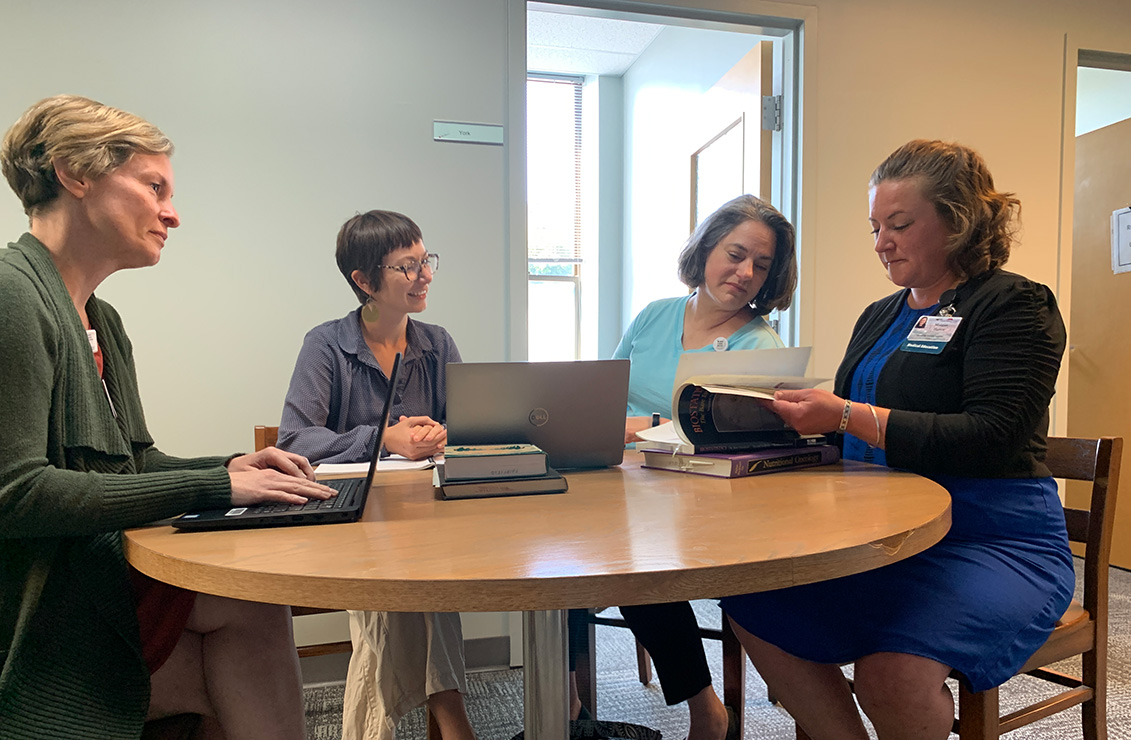Advancing Research to Meet the Needs of Rural Maine Communities

Internal research team members include (L-R): Gretchen Noonan, MS; Emma DayBranch, MPH; Dina McKelvy, and Maegan Halica (not pictured Carrie Sullivan, MPH)
The average time it takes to bring research into clinical practice is 17 years. And this may take even longer in rural settings where health care organizations and providers lack ready access to academic resources and timely, relevant evidence which can inform new ways of providing health care and impact their routine treatment and care decisions.
These delays contribute to rural and other health disparities in Maine. Elizabeth Jacobs, MD, MPP, Investigator for the MaineHealth Institute for Research, is the co-lead on a two-year research capacity-building project that could help close this gap.
The project, funded by the Patient-Centered Outcomes Research Institute (PCORI), began in early 2023 and is building capacity for research dissemination and its translation into practice. PCORI is a nationally recognized funder that is unique in its prioritization of the stakeholder voice and expertise throughout a research project.
More Equitable Access to the Latest Research
Dr. Jacobs and co-project lead Lisbeth Balligan, MPH, Research Program Director, along with their team and stakeholder collaborators, aim to create a robust, sustainable infrastructure for disseminating evidence from patient-centered outcomes research/comparative effectiveness research (PCOR/CER) studies. The goal is to make it easier for rural organizations and leaders to use this evidence to address the needs of their patients and communities.
The initial focus of the project is the dissemination of research that investigates how to improve the delivery of behavioral health and opioid use disorder treatment, both important priorities in Maine communities.
The research team has created a Research Dissemination Advisory Panel comprised of health care administrators and medical professionals from across Maine. The panel gives guidance on the study content and on the dissemination of scientific evidence that is most relevant to rural Mainers. This includes:
- Guiding the development and distribution of easy-to-read, one-page research summaries
- Creating a publicly-accessible repository of PCOR/CER studies
- Hosting learning events
“There is a great deal of research taking place – yet we haven’t spent time on the implementation of that work. Engaging stakeholders through our Research Dissemination Advisory Panel provides a broad and deep perspective on the challenges of integrating scientific evidence across Maine, as well as creates an environment for innovative strategies and best practices to rise to the top.” said Jacobs.
The majority of the planning work, phase one of the study, began in early 2023. Phase two will be about building infrastructure to disseminate the findings. This phase could take two to three years.
“I am excited about the upcoming community feedback sessions later this year. I’m also eager to witness the sharing of information across Maine and our stakeholders, which will help create a stronger and lasting framework with active community involvement.”
– Lisbeth Balligan, MPH
Having an established infrastructure and standardized process for making research findings more accessible to health care leaders and providers will help decrease rural health disparities across Maine. By reducing the time-to-implementation of evidence-based interventions, we can improve patient care and health outcomes. Ultimately, this contributes to MaineHealth’s vision of “working together so our communities are the healthiest in America.”
MaineHealth Institute for Research (MHIR)
MaineHealth Institute for Research supports a broad spectrum of research−including basic laboratory-based research, translational research, clinical research and health services research. Learn more about MHIR.

